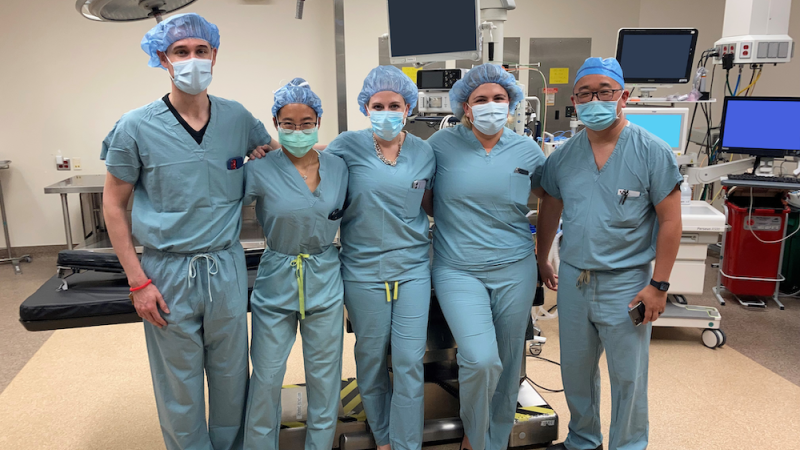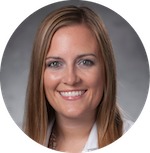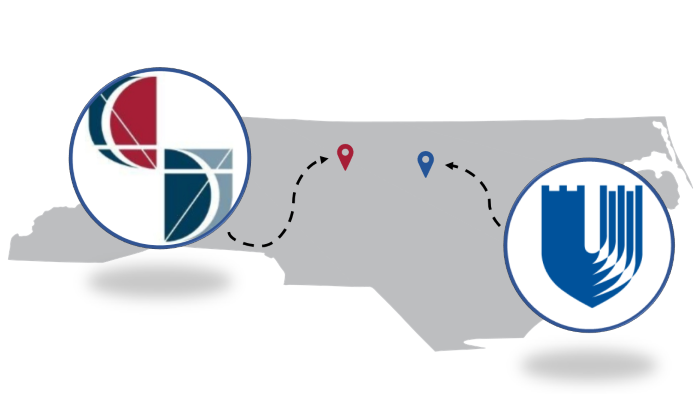
New Beginnings: Duke Department of Surgery Collaborates with Central Carolina Surgery
Photo above: (Left to Right) General Surgery residents Dr. Paul Schroder, Dr. Lillian Kang, Dr. Sarah Jane Commander, and Dr. Mariya Samoylova with CCS President Dr. Matthew Tsuei in the CCS OR.
September 2021 marks the first step to a broader experience for some senior residents at Duke’s General Surgery Residency Program, established through a new partnership between Duke Section of Surgical Disciplines and Central Carolina Surgery (CCS).

Vice Dean of the Section of Surgical Disciplines
What started as an informal discussion on a possible collaboration between Duke and CCS surgeons expanded to a meeting between Professor of Surgery and Vice Dean of the Section of Surgical Disciplines Allan D. Kirk, MD, PhD, FACS, and President of Central Carolina Surgery Matthew Tsuei, MD, FACS.
“It was apparent from my first meeting with Dr. Tsuei and his team that we are completely aligned in our pursuit of high quality, patient-centric care,” says Dr. Kirk. “The CCS group is clearly the top surgical program in the Triad, and it quickly became apparent that their expertise in the mainstay general surgical operations would be of value to our residents, and that our residents would add a new dimension to their practice as well. Everyone improves when learners enter the environment.”
“Bread and Butter” of Surgical Training
Located in Greensboro, North Carolina, CCS is the sole independent general surgery group in the area. CCS is a group of 20 surgeons that covers most aspects of general surgery, including trauma, colorectal, bariatric, hepatopancreatobiliary, and endocrine surgeries. This brought in the opportunity for senior residents starting in their third year of the Duke General Surgery Residency Program to get more hands-on training in the operating room with the CCS surgical team.

President of Central
Carolina Surgery
“The premise is that one resident will come work with us each month, essentially operating throughout their stay, doing a significant number of relatively routine cases repetitively so that they learn how to do them well,” says Dr. Tsuei. “This would allow the general surgery residents to have a broader experience of what some people would call the ‘bread and butter’ or normal general surgery cases in an environment where they’re not running into other residents to compete for cases.”
Normally, surgical cases are assigned to residents based on their rotation in the program, and competition can be high. With only one senior general surgery resident training at CCS, they will have the opportunity to select their cases.
“We will meet with Dr. Tsuei at the beginning of each week and go over what cases are going to be available for the week,” says Sarah Jane Commander, MD, MHS, PGY-5 General Surgery Resident. “Together we will choose which ones we should go into based on what our interests are.”

The ability for residents to create an individualized schedule based on their chosen area of focus allows them to perfect their operative skills through repetition and an increase in volume.
Even working on small cases, the more residents perform them, the more comfortable the residents will get with how they conduct themselves in the operating room.
Changes Toward Better Patient Care
For the surgeons at CCS, the new experience of training residents will bring an exciting challenge.
“Training residents can make surgery more exciting and rejuvenating,” says Dr. Tsuei. “It will give us a different perspective on how we as surgeons here in CCS approach the case rather than just concentrating on how we’re going to perform the surgery. Now, standing on the other side of the operating table and being able to teach someone else how to do the case gives us a different perspective on surgery.”
Likewise, the residents from Duke will switch from a major hospital to a private practice in a community setting. Many general surgery residents at Duke are exposed to patients in need of complex procedures, such as a heart transplantation. At CCS, they will be able to treat patients who will not require this level of care.

Graphic showing the locations of Central Carolina Surgery in Greensboro, NC, and Duke University Hospital in Durham, NC.
Being exposed to patient care in both an academic hospital and community private practice will bring a more well-rounded experience. The care in CCS will be more straightforward, and the residents will go back to basics. This will allow them to create a solid surgical foundation to build upon for their careers in any specialty. For some, training at CCS will also be a more accurate representation of what their careers will look like after residency.
“When you’re in training, it is very important to do the most complex cases that you possibly can,” says Dr. Commander. “But if that’s all you ever see, that is not an accurate representation of reality. So, I believe that this opportunity will expose us to a more accurate representation of a career in general surgery, and allow us to form a solid surgical foundation.”
Looking Ahead
The purpose of the surgical residency program at Duke is to prepare the next generation of surgeons through training and mentorship. Collaborating with CCS is the next step in ensuring well-rounded and highly experienced surgeons.
“This is a time for them to get good repetitive experience and recharge from the usual pace of residency,” says Dr. Tsuei. “Some of the cases they will do with us here at CCS will seem mundane, but they are cases that need to be done in the community, and they have to be done well. Our goal is to teach them how to do even the simplest cases well, so that they may bring the best care to their future patients.”
Give to Duke Surgery
A gift to the Department of Surgery is a gift of knowledge, discovery, and life.